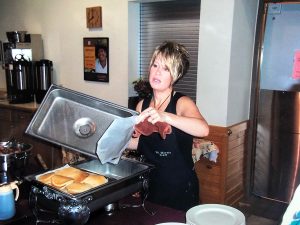Say the word, “joy” to anyone who has been to Mt. Morris Camp and Conference Center in central Wisconsin and they may wonder if you mean “joy” the fruit of the Spirit, or Joy Witkowski, the Food and Beverage Director at Mt. Morris. Recently, I had the pleasure of catching up with Joy – who embodies the spirit of hospitality – to talk about connections between food and worship. The following are excerpts and highlights from our conversation:
Brian: Joy, you talked about how in the story of the manna and quail (Exodus 16) – God provides… And, although we may want more variety or something different, one lesson is that our needs will be met. And, that the provision comes from God.
Joy: That’s right. And the variety of the food is not what’s necessary, but when you do have it – what a gift it is. That’s how I feel. And, like I told you the cheese story… I love cheese. God could have made one kind. There’s a ton of different kinds. And that, to me, is a gift.
That there are so many kinds of cheese?
Yes. As in anything, like the different kinds of cuisine we talked about. Or, coffee or spices or whatever; there could have been one or two. But, there are tons of them. And, I think it’s in how you envision the variety and choose to see it as a gift.
[Joy conveys a deep faith that God’s provision is more than enough – that it is extravagant: milk and honey, water made wine, baskets of leftovers after thousands are fed, etc. As we talk, we compare the difference between the Sabbath and other days of the week to the difference between fast food and a home-cooked meal. We wonder how this could impact worship; to think of it as a meal to be savored and shared. The conversation turns to food as an experience not only of sharing, but also serving. Joy relates a very personal story and experience of this.]
 Joy: This last summer, with my dad passing… I have never dealt with that before. And, a friend would call and say: Can we bring something to eat? And, I’m like: No, no. That’s okay. We’re fine. We have cooks in the family. We do this. And, they’d bring it over anyway. And, it was wonderful. It was just so good to… I don’t know how to describe it. I’ve just never been on the receiving end of that. It was such a wonderful way to care for somebody else. And, when you have company, to have enough food for everybody so you can sit and visit and not be preparing food… So, that is one of the greatest services that I could imagine to somebody who is grieving or that needs comfort.
Joy: This last summer, with my dad passing… I have never dealt with that before. And, a friend would call and say: Can we bring something to eat? And, I’m like: No, no. That’s okay. We’re fine. We have cooks in the family. We do this. And, they’d bring it over anyway. And, it was wonderful. It was just so good to… I don’t know how to describe it. I’ve just never been on the receiving end of that. It was such a wonderful way to care for somebody else. And, when you have company, to have enough food for everybody so you can sit and visit and not be preparing food… So, that is one of the greatest services that I could imagine to somebody who is grieving or that needs comfort.
Brian: How did you adjust to being on the receiving end of that?
Well, of course I told them: Don’t bring anything. We’re fine. And, then they did anyways. And, it was really, really nice. And, if you say, “No,” you’re also denying somebody the privilege of sharing and serving God, too. Not that you shouldn’t say, “No.” But, that was their opportunity. I just didn’t want to inconvenience anyone by having to make extra food. But, it was so wonderful. And, it was good.
Had you experienced that growing up? Your dad was a pastor. So, had you seen that as a child, or with your father’s ministry? You shared about having a big family garden; the work and service part of all that. How did you connect food and Christian service?
Well, you could see the church I grew up in from the highway. And, when anybody would come off the road needing help or food, they would come right to our church. We had a lot of people coming to the house needing food that were traveling somewhere and didn’t have enough. And, I remember Dad talking to them in the living room and my mom making sandwiches. That happened quite a bit when I was growing up.
Being from a large family, food was always a big part of our life. And, I loved to eat. I remember my mom baking homemade bread and all I wanted was bread from the store. But, making bread from scratch was one of the countless ways she took care of her family. And, now I understand that. So, it’s been a part of everything I experienced growing up. And, with Dad in the ministry in a small town, we were there any time someone passed, or had a child, or celebrated a wedding. Food was always a part of that.
[We compare notes on traditions around rites of passage, grief, and caring. Of course, we see that food gathers people. It works as a social catalyst, a form of entertainment, or a kind of diversion. But, food also relates to more serious matters: hunger, loneliness, illness, even abuse. It can be a tangible experience of restored connection and community.]
Joy: I love that people congregate in the kitchen. Sometimes it gets busy in there. But, there is something about kitchens that draw people in. And, you can always start a conversation with somebody about food. They have either a memory or a story or some strong preference. I don’t care who you talk to. You can really get to know people that way. And I enjoy that everybody has their likes and dislikes; comfort food that takes them back. It’s why I always serve cookies straight from the oven. Because it’s just the only way you can enjoy them best. I like those details.
Brian: Does food teach us about God? Can it show us that God is not just an idea? That God is in the details, as real as food in “taste and see” kind of ways?
I feel that God has used food to teach us in a lot of ways. With communion – that’s very tangible – but, food is also part of the Fall. Eating an apple, that was the other end of the spectrum; but it is something that we can understand. And when Jesus was born, and he was brought gifts, there was no food involved.
You’re right! Gold, frankincense and myrrh. Nothing there for a baby to chew on.
Or, to nourish Mary. And, I think that’s interesting, because Jesus is the Provider. He didn’t require that. And, so the absence of food there is meaningful to me. Jesus not only came to serve and meet our needs and provide for us, but he gives us countless varieties of everything.
[Our conversation comes full circle and closes with reflection on the community that forms around food service: from farmers to chefs to servers to diners to dishwashers, etc. When everyone, at every level, realizes they are part of the life of the kitchen, or restaurant or café, that every little thing they do is part of a greater work—just like the Kingdom of God—it encourages us to share greater joy in the work and to offer our best.]
Joy: And, all because people need to eat.
Brian: All, because people need to eat.
The Rev. Brian Dixon is pastor of Lake Auburn Moravian Church in Victoria, Minn.







